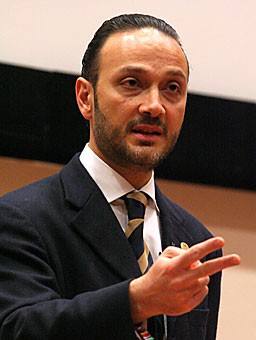The U.S. and Mexico need to reform border policies to create a functional human-rights conscious border, an inspector for Mexico’s National Human Rights Commission said Friday at the Manuel T. Pacheco Integrated Learning Center.
Mauricio Farah’s speech, titled “”Mexico-U.S. Migration: Let’s Talk About Solutions,”” was originally scheduled for last year, but Farah left before giving the speech amid shouts from audience members demanding the lecture, which was in Spanish, be conducted in English or that interpretation be provided.
Friday’s speech, which about 200 people attended, offered free simultaneous English translation. Last year’s controversy spurred several members of the Tucson Police Department to staff the event.
In his speech, Farah said immigrants benefit the U.S. Immigrants pay taxes and rent, and keep industries, such as agriculture and domestic service, afloat here, Farah said. He added that immigrants are not taking jobs from U.S. workers, but, rather, are filling jobs those workers are unable to do.
Farah outlined four main topics of the National Human Rights Commission that would create a more humane border.
First, Farah said, there needs to be a reduction of the need for immigration – a responsibility that falls on both Mexico and the U.S. This would include creating jobs in Mexico and Central America that attract workers.
“”There is a need for the workers in the U.S. and the need to come out of hiding with legal options.””
– Mauricio Farah,
Human Rights
Commission inspector
He said there also needs to be a more open, streamlined way of attaining legal immigration to the U.S.
Next, illegal immigrants already in the U.S. need to have a clear path to legalization, he said.
“”There is a need for the workers in the U.S. and the need to come out of hiding with legal options,”” Farah said through an interpreter.
Additionally, the taxes legal workers would pay would be enough to revitalize systems such as Social Security, Farah said.
Finally, he said there needs to be a move toward a more human rights-focused approach to border control.
The U.S. Border Patrol has been unable to stop illegal immigrants from crossing the border, Farah said. More than two Mexicans per day have died attempting to cross the border over the past decade, and many groups believe the number of illegal immigrants crossing will increase over the next two decades.
Containment methods have also proved inefficient, resulting in immigrants crossing the border in more dangerous areas through the desert, he said.
Farah fielded questions from the audience, including one from a woman who demanded to know why Mexico could not take care of its own citizens.
Farah said the U.S. and Mexico are at a crossroads when it comes to border policy, and that a change is needed.
“”You cannot expect different results if you are doing the same things,”” Farah said.









